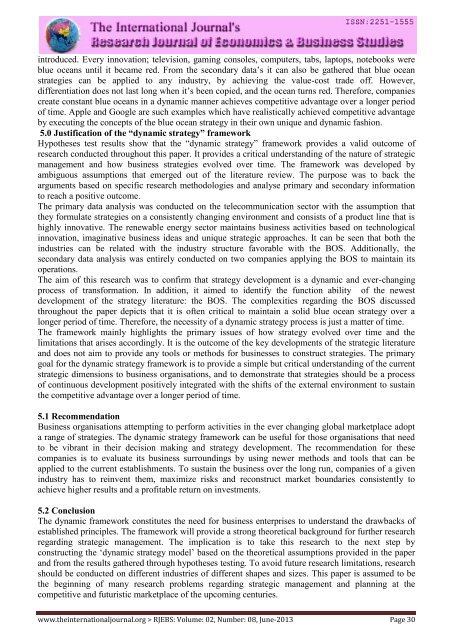Research Journal of Economics & Business Studies - RJEBS - The ...
Research Journal of Economics & Business Studies - RJEBS - The ...
Research Journal of Economics & Business Studies - RJEBS - The ...
- No tags were found...
Create successful ePaper yourself
Turn your PDF publications into a flip-book with our unique Google optimized e-Paper software.
introduced. Every innovation; television, gaming consoles, computers, tabs, laptops, notebooks were<br />
blue oceans until it became red. From the secondary data’s it can also be gathered that blue ocean<br />
strategies can be applied to any industry, by achieving the value-cost trade <strong>of</strong>f. However,<br />
differentiation does not last long when it’s been copied, and the ocean turns red. <strong>The</strong>refore, companies<br />
create constant blue oceans in a dynamic manner achieves competitive advantage over a longer period<br />
<strong>of</strong> time. Apple and Google are such examples which have realistically achieved competitive advantage<br />
by executing the concepts <strong>of</strong> the blue ocean strategy in their own unique and dynamic fashion.<br />
5.0 Justification <strong>of</strong> the “dynamic strategy” framework<br />
Hypotheses test results show that the “dynamic strategy” framework provides a valid outcome <strong>of</strong><br />
research conducted throughout this paper. It provides a critical understanding <strong>of</strong> the nature <strong>of</strong> strategic<br />
management and how business strategies evolved over time. <strong>The</strong> framework was developed by<br />
ambiguous assumptions that emerged out <strong>of</strong> the literature review. <strong>The</strong> purpose was to back the<br />
arguments based on specific research methodologies and analyse primary and secondary information<br />
to reach a positive outcome.<br />
<strong>The</strong> primary data analysis was conducted on the telecommunication sector with the assumption that<br />
they formulate strategies on a consistently changing environment and consists <strong>of</strong> a product line that is<br />
highly innovative. <strong>The</strong> renewable energy sector maintains business activities based on technological<br />
innovation, imaginative business ideas and unique strategic approaches. It can be seen that both the<br />
industries can be related with the industry structure favorable with the BOS. Additionally, the<br />
secondary data analysis was entirely conducted on two companies applying the BOS to maintain its<br />
operations.<br />
<strong>The</strong> aim <strong>of</strong> this research was to confirm that strategy development is a dynamic and ever-changing<br />
process <strong>of</strong> transformation. In addition, it aimed to identify the function ability <strong>of</strong> the newest<br />
development <strong>of</strong> the strategy literature: the BOS. <strong>The</strong> complexities regarding the BOS discussed<br />
throughout the paper depicts that it is <strong>of</strong>ten critical to maintain a solid blue ocean strategy over a<br />
longer period <strong>of</strong> time. <strong>The</strong>refore, the necessity <strong>of</strong> a dynamic strategy process is just a matter <strong>of</strong> time.<br />
<strong>The</strong> framework mainly highlights the primary issues <strong>of</strong> how strategy evolved over time and the<br />
limitations that arises accordingly. It is the outcome <strong>of</strong> the key developments <strong>of</strong> the strategic literature<br />
and does not aim to provide any tools or methods for businesses to construct strategies. <strong>The</strong> primary<br />
goal for the dynamic strategy framework is to provide a simple but critical understanding <strong>of</strong> the current<br />
strategic dimensions to business organisations, and to demonstrate that strategies should be a process<br />
<strong>of</strong> continuous development positively integrated with the shifts <strong>of</strong> the external environment to sustain<br />
the competitive advantage over a longer period <strong>of</strong> time.<br />
5.1 Recommendation<br />
<strong>Business</strong> organisations attempting to perform activities in the ever changing global marketplace adopt<br />
a range <strong>of</strong> strategies. <strong>The</strong> dynamic strategy framework can be useful for those organisations that need<br />
to be vibrant in their decision making and strategy development. <strong>The</strong> recommendation for these<br />
companies is to evaluate its business surroundings by using newer methods and tools that can be<br />
applied to the current establishments. To sustain the business over the long run, companies <strong>of</strong> a given<br />
industry has to reinvent them, maximize risks and reconstruct market boundaries consistently to<br />
achieve higher results and a pr<strong>of</strong>itable return on investments.<br />
5.2 Conclusion<br />
<strong>The</strong> dynamic framework constitutes the need for business enterprises to understand the drawbacks <strong>of</strong><br />
established principles. <strong>The</strong> framework will provide a strong theoretical background for further research<br />
regarding strategic management. <strong>The</strong> implication is to take this research to the next step by<br />
constructing the ‘dynamic strategy model’ based on the theoretical assumptions provided in the paper<br />
and from the results gathered through hypotheses testing. To avoid future research limitations, research<br />
should be conducted on different industries <strong>of</strong> different shapes and sizes. This paper is assumed to be<br />
the beginning <strong>of</strong> many research problems regarding strategic management and planning at the<br />
competitive and futuristic marketplace <strong>of</strong> the upcoming centuries.<br />
www.theinternationaljournal.org > <strong>RJEBS</strong>: Volume: 02, Number: 08, June-2013 Page 30

















